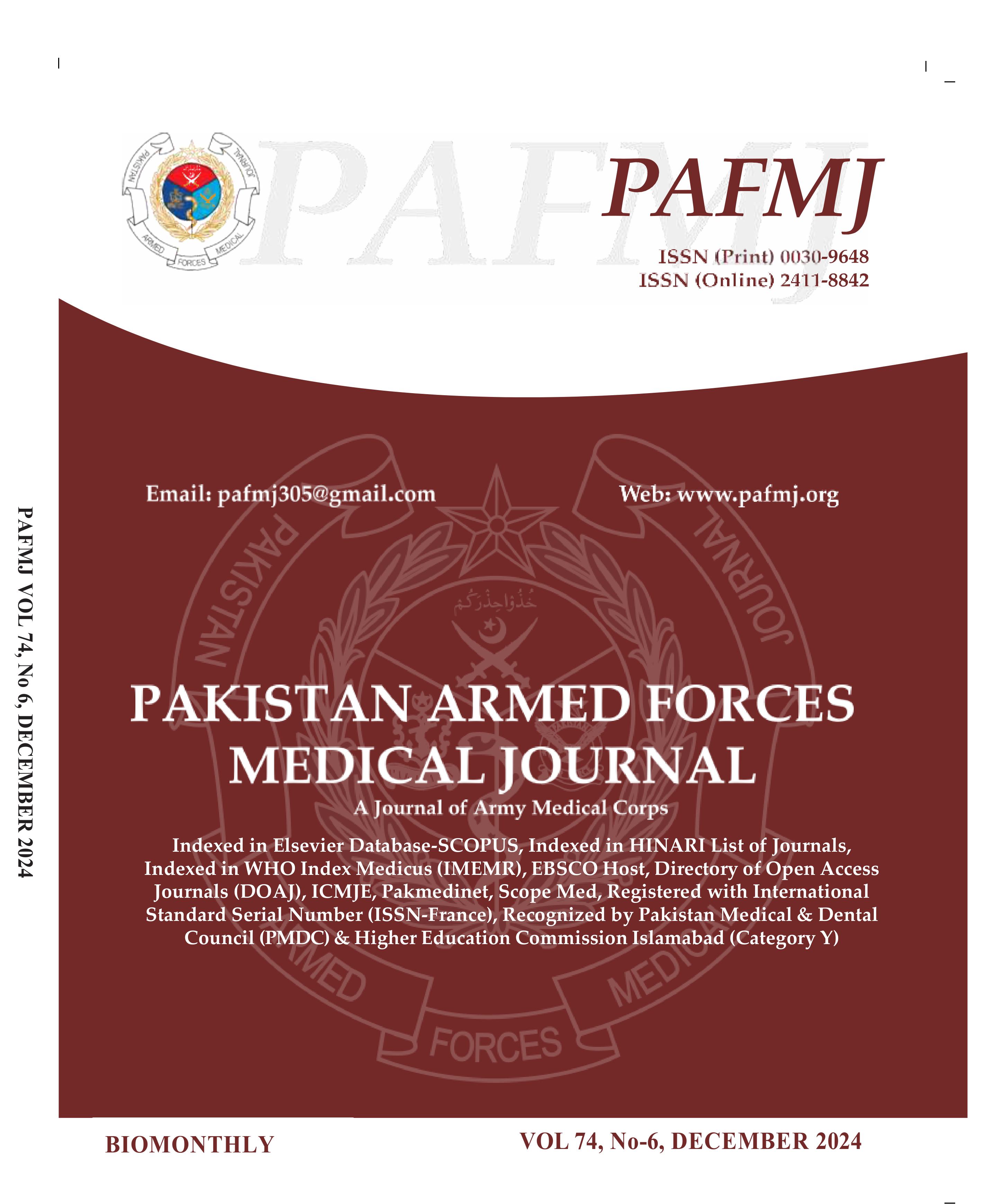Breathe Stronger, Walk Farther: Inspiratory Muscle Training Post Lung Resection Surgery A Systematic Review
DOI:
https://doi.org/10.51253/pafmj.v74i6.12118Keywords:
Six-Minute Walk Test, Respiratory Function Test, Respiratory Muscle Training, Post-Lung Resection Surgery.Abstract
Objective: To assess the efficacy of Inspiratory Muscle Training (IMT) on functional exercise capacity and pulmonary functions using the six-minute walk test and spirometry in patients undergoing lung resection surgery.
Study Design: Systematic review.
Methodology: Randomized controlled clinical trials (RCTs) were selected from four databases, including Google Scholar, PEDro, Cochrane Library, and PubMed. Two reviewers independently assessed the studies' quality. Eight randomized controlled trials examined the effectiveness of IMT on pulmonary functions and functional exercise capacity following lung resection surgeries.
Results: High-to-moderate evidence shows that inspiratory muscle training is effective in improving functional exercise capacity and pulmonary functions post-operatively in patients with lung resection surgery.
Conclusion: The conclusions of this systematic review indicated that postoperative inspiratory muscle training, either administered alone or in conjunction with other combined interventions, improved patients' functional pulmonary capacity and further enhanced other outcomes, such as physical activity and muscle strength.
Downloads
References
Ganti AK, Klein AB, Cotarla I, Seal B, Chou E. Update of incidence, prevalence, survival, and initial treatment in patients with non–small cell lung cancer in the US. JAMA Oncology 2021 ; 7(12): 1824-1832. https://doi.org/10.1001/jamaoncol.2021.4932
Melosky B, Kambartel K, Haentschel M, Bennetts M, Nickens DJ, Brinkmann J, et al. Worldwide prevalence of epidermal growth factor receptor mutations in non-small cell lung cancer: a meta-analysis. Mole Diagn Ther 2022; 26(1): 7-18.
https://doi.org/10.1007/s40291-021-00563-1
Uhlig C, Neto AS, Van Der Woude M, Kiss T, Wittenstein J, Shelley B, et al. Intraoperative mechanical ventilation practice in thoracic surgery patients and its association with postoperative pulmonary complications: results of a multicenter prospective observational study. BMC Anesthesiol 2020; 20: 1-2.
https://doi.org/10.1186/s12871-020-01098-4
Peddle‐McIntyre CJ, Singh F, Thomas R, Newton RU, Galvão DA, Cavalheri V. Exercise training for advanced lung cancer. Cochrane Database System Rev 2019(2): 12685.
https://doi.org/10.1002/14651858.CD012685.pub2
Ahmad AM. Essentials of physiotherapy after thoracic surgery: What physiotherapists need to know. A narrative review. Korean J Thoracic Cardiovasc Surg 2018 ; 51(5): 293.
https://doi.org/10.5090%2Fkjtcs.2018.51.5.293
Avancini A, Sartori G, Gkountakos A, Casali M, Trestini I, Tregnago D, et al. Physical activity and exercise in lung cancer care: will promises be fulfilled?. Oncologist 2020 ; 25(3): e555-569.
https://doi.org/10.1634/theoncologist.2019-0463
Laurent H. Physical activity and lung cancer: A synthesis of the literature. Revue des Maladies Respiratoires 2023:S0761-8425. https://doi.org/10.1016/j.rmr.2023.03.003
Zhou T, Sun C. Effect of physical manipulation pulmonary rehabilitation on lung cancer patients after thoracoscopic lobectomy. Thoracic Cancer 2022; 13(3): 308-315.
https://doi.org/10.1111/1759-7714.14225
Borghetti P, Branz J, Volpi G, Pancera S, Buraschi R, Bianchi LN, et al. Home-based pulmonary rehabilitation in patients undergoing (chemo) radiation therapy for unresectable lung cancer: A prospective explorative study. La Radiol Med 2022; 127(12): 1322-1332.
https://doi.org/10.1007/s11547-022-01562-w
Lähteenmäki S, Sioris T, Mahrberg H, Rinta-Kiikka I, Laurikka J. Inspiratory training and immediate lung recovery after resective pulmonary surgery: a randomized clinical trial. J Thoracic Dis 2020; 12(11): 6701.
https://doi.org/10.21037%2Fjtd-20-1668
Libguides: Creating a prisma flow diagram: Prisma 2020 (no date) PRISMA 2020 - Creating a PRISMA flow diagram - LibGuides at University of North Carolina at Chapel Hill. Available at: https://guides.lib.unc.edu/prisma (Accessed on December 11, 2023)
Higgins PT. Cochrane Handbook for Systematic Reviews of interventions. Hoboken, NJ: Wiley-Blackwell, 2020.
https://doi.org/10.1002/9781119536604
Ha DM, Comer A, Dollar B, Bedoy R, Ford M, Gozansky WS, et al. Telemedicine-based inspiratory muscle training and walking promotion with lung cancer survivors following curative intent therapy: a parallel-group pilot randomized trial. Supportive Care Cancer. 2023; 31(9): 546.
https://doi.org/10.1007/s00520-023-07999-7
Kendall F, Silva G, Almeida J, Eusébio E, Pinho P, Oliveira J, Bastos PT. Influence of respiratory muscle training on patients’ recovery after lung resection. International J Sports Med 2020 ; 41(07): 484-491. https://doi.org/10.1055/a-1096-0913
Taşkin H, Telli Atalay O, Yuncu G, Taşpinar B, Yalman A, Şenol H. Postoperative respiratory muscle training in addition to chest physiotherapy after pulmonary resection: A randomized controlled study. Physiother Theory Pract 2020; 36(3): 378-385. https://doi.org/10.1080/09593985.2018.1488189
Liu JF, Kuo NY, Fang TP, Chen JO, Lu HI, Lin HL. A six-week inspiratory muscle training and aerobic exercise improves respiratory muscle strength and exercise capacity in lung cancer patients after video-assisted thoracoscopic surgery: a randomized controlled trial. Clin Rehab 2021; 35(6): 840-850. https://doi.org/10.1177/0269215520980138
Messaggi-Sartor M, Marco E, Martínez-Téllez E, Rodriguez-Fuster A, Palomares C, Chiarella S, et al. Combined aerobic exercise and high-intensity respiratory muscle training in patients surgically treated for non-small cell lung cancer: a pilot randomized clinical trial. Eur J Phys Rehab Med 2018; 55(1): 113-122. https://doi.org/10.23736/s1973-9087.18.05156-0
Kuo NY, Liu JF, Lu HI, Lo CM, Hsien LC, Chang CL, Hsu M. Home-Based Pulmonary Rehabilitation in Aged Individuals With Lung Tumor After Thoracoscopic Surgery. Top Geriatr Rehab 2022 ; 38(2): 110-119.
http://doi.org/10.1097/TGR.0000000000000352
Lähteenmäki SI, Sioris T, Mahrberg HS, Rinta-Kiikka IC, Laurikka JO. A randomized trial comparing inspiratory training and positive pressure training in immediate lung recovery after minor pleuro-pulmonary surgery. J Thorac Dis 2021 ; 13(8): 4690. https://doi.org/10.21037%2Fjtd-21-473
Tao W, Huang J, Jin Y, Peng K, Zhou J. Effect of pulmonary rehabilitation exercise on lung volume and respiratory muscle recovery in lung cancer patients undergoing lobectomy. Altern Therap Health Med 2024 ; 30(2): 1233-1231. https://doi.org/10.1186/s12957-017-1233-1
Downloads
Published
Issue
Section
License
Copyright (c) 2024 Sana Shahzad, Ayesha Sonia, Danish Zaman, Saima Ali, Hamza Ahmed, Muhammad haris Raza

This work is licensed under a Creative Commons Attribution-NonCommercial 4.0 International License.















